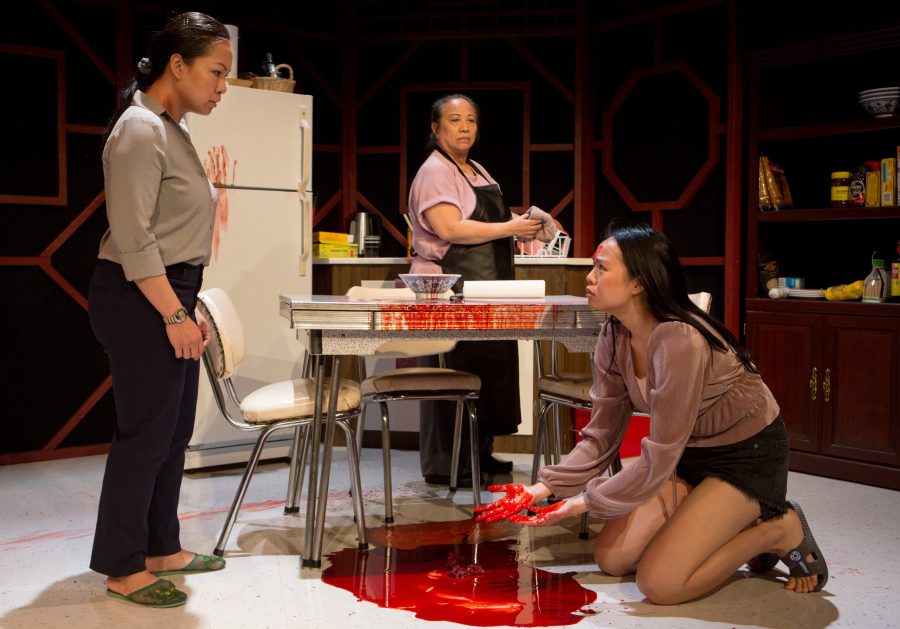
THREE WOMEN OF SWATOW by Chloé Hung (Tarragon, 30 Bridgman). Runs to May 20, digital version May 15-25 $15-$50, virtual $15-$25. tarragontheatre.com. Rating: NNN
The idea of intergenerational trauma has existed at least since the time of the bloody goings-on at the House of Atreus, but only recently has it begun to be discussed in mainstream circles. Conversations about films like Encanto and Turning Red have focused heavily on the idea of toxic behaviour and big bad secrets passed down (and not discussed) through the ages.
The families in those two movies have nothing on the three women in Chloé Hung’s new play, however. At one point in the 80-minute show, each woman has her hands covered in blood – both literal and figurative. And I’m not sure any of the magically endowed kids from the Encanto clan could successfully face off against Carolyn Fe’s fierce, gin-guzzling, knife-wielding Chinese Grandmother.
She’s the first person we see, reading aloud from the Bible, drinking booze, disrobing to her underwear because of the heat. When her Canadian-born granddaughter (Diana Luong) appears, it becomes clear that the two are living together. And what about the younger woman’s mother? She – called the Mother (Chantria Tram) in the show’s program – has left an anxious, portentous voice mail with the Grandmother.
Soon, in a scene that’s like something from a gruesome horror film, the older woman is methodically helping her daughter clean up a mess. And if she’s strangely relaxed, practical and even jokey about things, she’s got some experience with cleaning up messes. She’s a butcher by training. She’s also hiding a violent past.
It’s probably best not to reveal more about the plot than that. Hung’s play exists on one level as melodrama, or as an examination of the aftermath of horrific and violent events. Whether that violence involves the blood the women are cleaning up or what led the women to commit those acts is another matter. And this kind of motivation is what the play is missing.
Still, there’s lots of skill in the way Hung moves, in a series of interstitial scenes, from the present-day narrative to the past, where patterns of abuse and violence are established. Even more fascinating is that the three actors play different roles in the past, so we literally see a daughter in one scene become the mother in the next.
Director Courtney Ch’ng Lancaster’s production looks fine in the intimate Tarragon Extra Space, where Jareth Li’s set has a cluttered, lived-in quality that feels authentic to these people’s busy lives. Deanna H. Choi’s compositions and sound designs are often discordant, which clue you in – sometimes with too heavy a hand – to the play’s disturbing goings-on.
And although their characters, with the exception of the Grandmother, aren’t as well-drawn as they could be, all three actors create distinct impressions. Fe can express more with her eyes than many actors can with pages of dialogue, and when she speaks you feel the weight of pain and history in her sardonic Grandmother. Tram’s arc from frightened and abused woman to powerful mother is exciting to watch. And Luong’s sensitive teenager contrasts beautifully with the powerful woman she plays in the past.
Hung’s play was originally scheduled for March 2020, but of course had to be postponed several times. Despite some holes in the script, it was worth waiting for.












